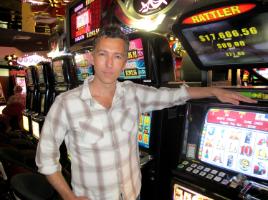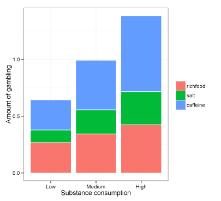Those with appetite for a 'quick hit' likely to be gamblers too
Published on 17 Jan, 2013
Media Contact: Via 0406 935 866 or (home) 07 4159 5129 or work 07 4150 7002For Immediate Release
Could an appetite for immediate, sensation-oriented rewards like alcohol, caffeine, smoking, illicit drugs and energy-rich foods (including salt) mean that people are more likely to be gamblers?
That's what a team based at CQUniversity's Experimental Gambling Laboratory have been trying to find out through phone surveys across the Central Queensland region.

Dr Matthew Browne
Click here to View/Download full-sized Image
The team have found surprising evidence linking gambling to the consumption of energy-laden snack foods, caffeine, and other stimulating substances.
"Should we recognise gambling as an appetitive behaviour? We suspect there is a common personality dimension explaining both higher levels of gambling and consumption of various stimulating substances," says team member Dr Matthew Browne, who is based at CQUniversity Bundaberg.
Dr Browne and his colleagues have applied a two-stage model that uses a variety of variables to explain both the probability that one gambles at all, and the quantity of gambling undertaken. They have found a statistically significant link between gambling and other consumption behaviours, even after controlling for demographic and social variables.

An info-graphic conveys how consumption of substances can predict gambling behaviour
Click here to View/Download full-sized Image
The study also confirmed other, less-surprising influences on the amount of time and money invested in gambling. For instance, single men were found to gamble significantly more than other groups.
Other researchers involved in the survey include Associate Professor Matthew Rockloff and Dr Phillip Donaldson from Bundaberg Campus and Dr En Li from Rockhampton.
ENDS

